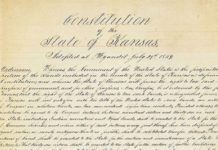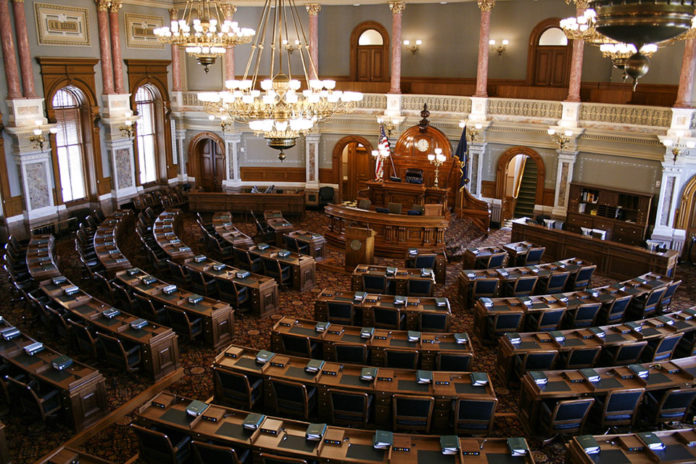Democratic state Rep. John Carmichael on Tuesday introduced a constititutional amendent eliminating legal immunity for legislators during the session.
Carmichael introduced his amendment in the Federal and State Affairs Committee, which is exempt from legislative deadlines although it was unknown when, or if, it would a get a hearing.
The Wichita Democrat’s amendment would eliminate a section of the Kansas Constitution that says no member of the legislature shall be subject to an arrest – “except for treason, felony or breach of the peace” – during the legislative session.

The section of the constitution also covers lawmaker traveling back and forth from the Capitol in Topeka.
Carmichael said the clause in the state constitution is anachronism, rooted in a time where poltical enemies would try to detain their rivals and keep them from getting to the Capitol to vote.
Carmichael used the example from the 1800s of a pro-slavery sheriff wanting to hold an abolitionist member of the Legislature so they couldn’t show up to vote.
“I don’t think that I’m at a great deal of risk for the sheriff in Emporia arresting me on the way to the session because he doesn’t like the way I’m going to vote on a particular bill,” Carmichael said.
“Instead, what these provisions do today is insulate legislators – at least temporarily – from their consquences of violating the law except for felony, treason and breach of the peace,” he said.
The amendment, which Carmichael would like to put on the November 2022 ballot, comes about a week after Senate Majority Leader Gene Suellentrop was arrested for suspicion of driving under the influence and fleeing police.
He was later released after a judge found a lack of evidence to support his arrest.
“I’ve thought about this for years. Why do we have still have it?” Carmichael asked of the legal immunity provision in the constitution.
Carmichael said he originally intended to introduce the legislation next year.
“Given recent events, it seemed it might be appropriate to at least have our Legislature introduce a bill to repeal this archaic and unncessary immunity,” he said.
Many states have similar provisions in their constitutions.
Many state constitutions give lawmakers immunity from things they say and do while debating issues at the Capitol, an issue Carmichael’s amendment doesn’t address.
They also include clauses – worded similarly to the Kansas Constitution – that give lawmakers legal immunity during a legislative session and while traveling back and forth to the Capitol.
Utah’s Constitution, for instance, says “members of the legislature, in all cases except treason, felony or breach of the peace, shall be privileged from arrest during each session of the Legislature, for fifteen days next preceding each session, and in returning therefrom…”
The Missouri Constitution reads similarly: “Senators and representatives shall, in all cases except treason, felony, or breach of the peace, be privileged from arrest during the session of the general assembly, and for the fifteen days next before the commencement and after the termination of each session…”
The issue surfaced in Minnesota seven years ago over so-called “legislative immunity” cards carried by lawmakers.
A bill was introduced establishing that certain crimes such as drunk driving were not covered by the state Constitution’s privilege clause.
The Minnesota secretary of state elected to no longer issue the cards, which stated that under the constitution lawmakers “in all cases except treason, felony and breach of the peace, shall be privileged from arrest” during the legislative session.
Fomer Attorney General Lori Swanson, in a 2014 opinion, said it appeared that the wallet-sized card “must have been intended to serve some additional purpose, presumably to be used in a situation involving an ‘arrest.'”
The attorney general’s 2014 opinion supported an effort to clarify the state constitution so – as it applied to modern cases – it would not get lawmakers out of an arrest for drunk driving or other crimes.
“It would be helpful and beneficial for the Minnesota Legislature to give additional direction to legislative members, the public, law enforcement and the courts by enacting legislation to clarify that legislators have no immunity from arrest including the crime of driving while intoxicated,” the attorney general wrote.















